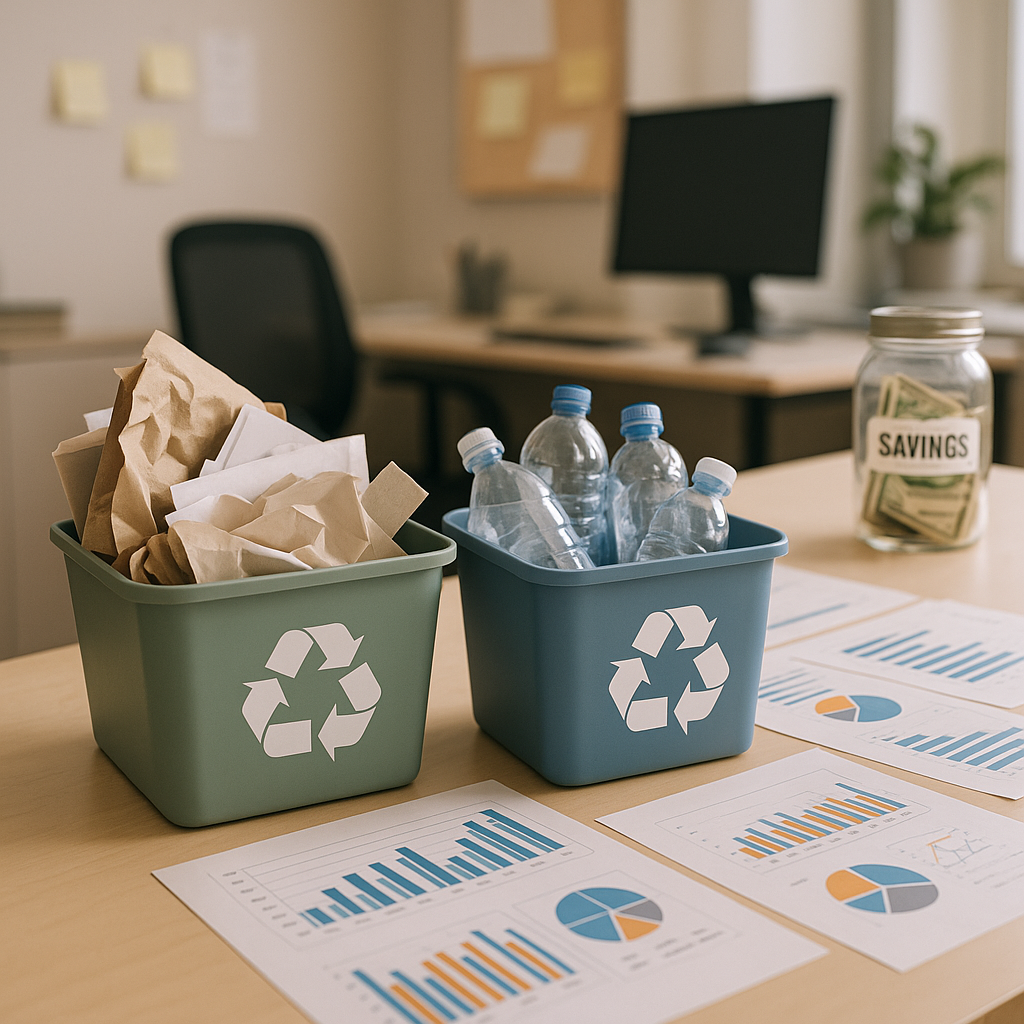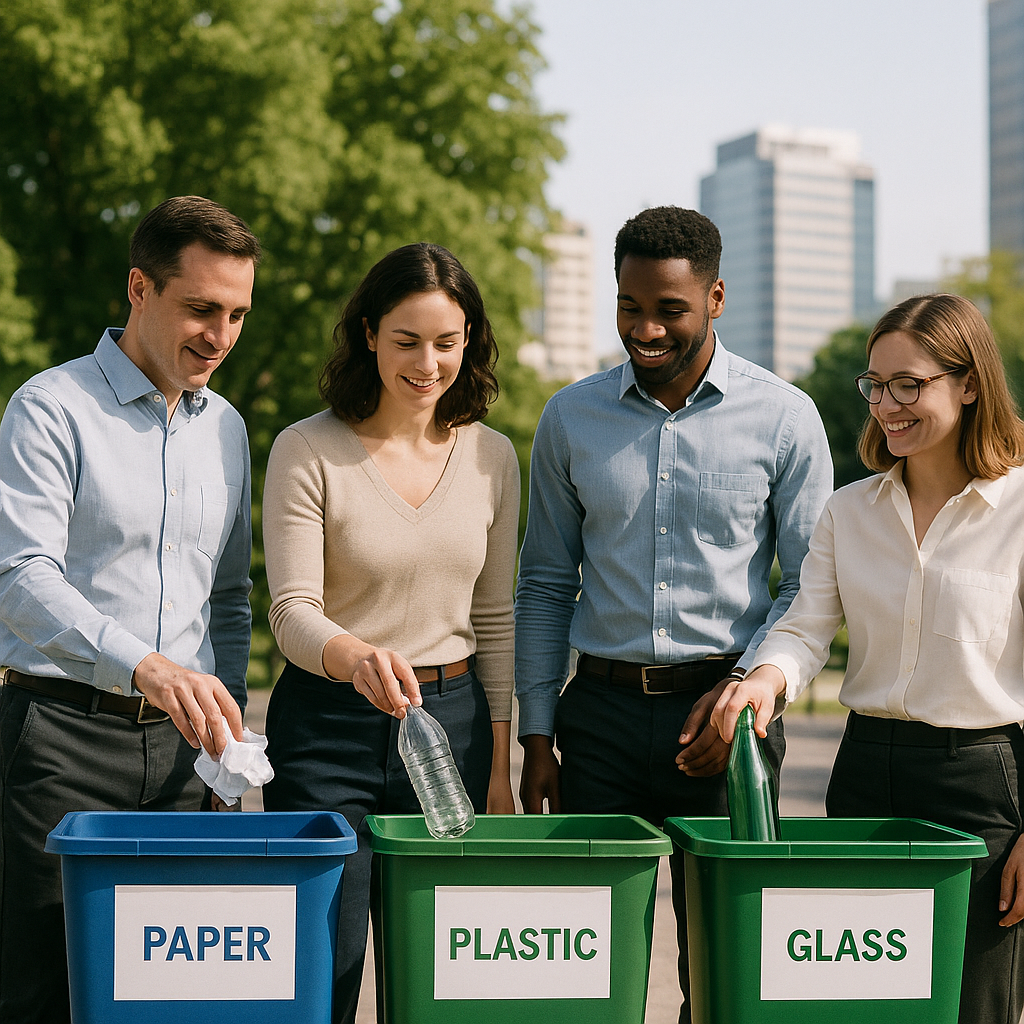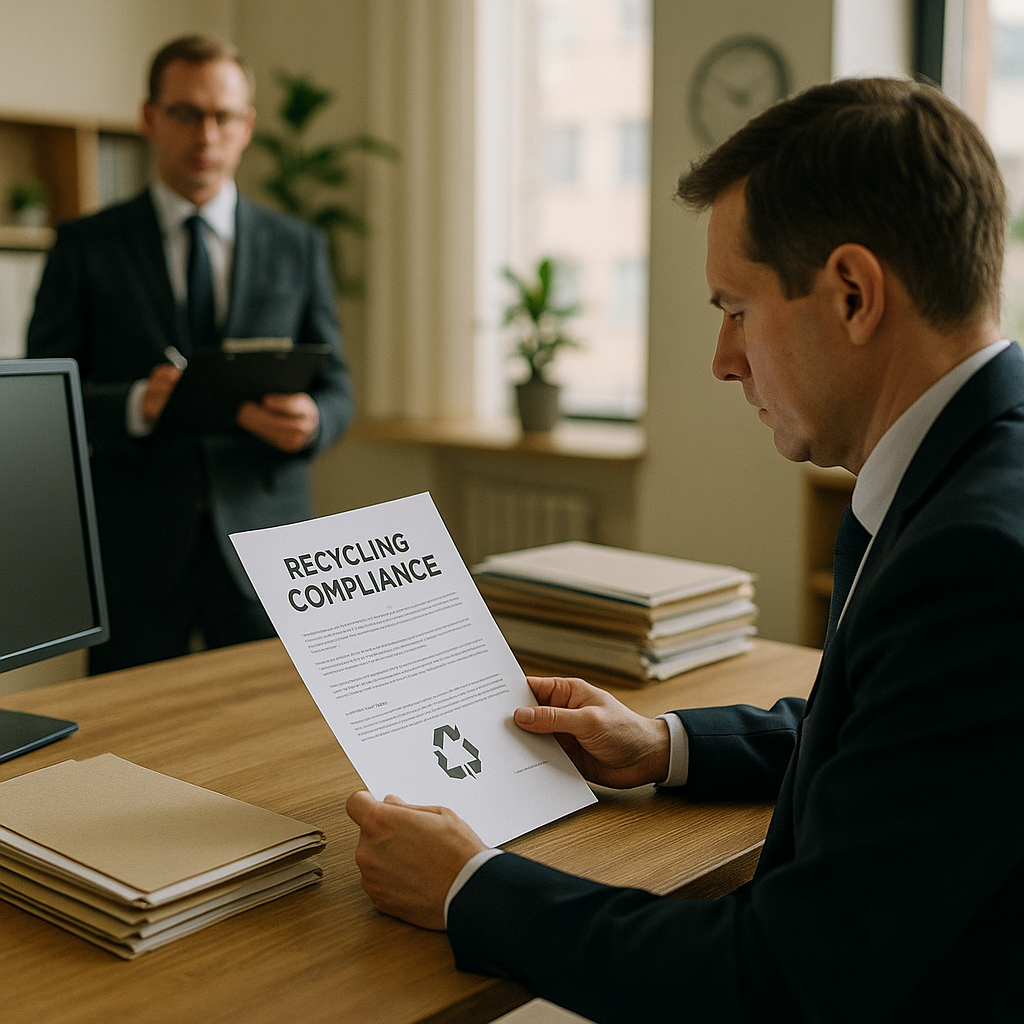5901 Botham Jean Blvd, Dallas, TX 75215
What Are the Key Benefits of Business Recycling?
July 2, 2025Did you know that efficient resource use through recycling practices could save UK businesses an estimated £23 billion every year? This significant figure highlights just one of the many advantages that recycling offers to companies of all sizes. Beyond financial benefits, implementing effective recycling programs provides substantial environmental and reputational gains.
Business recycling represents a strategic approach to waste management by transforming discarded materials into valuable resources. Companies increasingly recognize that proper recycling is not only an environmental choice but also a smart business decision. The practice reduces operational costs while demonstrating environmental responsibility.
From cutting waste disposal fees to enhancing brand reputation, recycling offers multiple ways for businesses to improve their bottom line and environmental performance. Explore how implementing recycling initiatives can benefit your business operations, customer relationships, and regulatory compliance.
How Does Recycling Save Businesses Money?

Recycling offers significant cost savings for businesses in various ways. Companies that implement effective recycling programs can substantially reduce waste disposal costs. With rising landfill fees, diverting recyclable materials from general waste streams notably impacts the bottom line. Many businesses report immediate savings on waste management expenses after starting recycling initiatives.
The financial benefits extend beyond just lower disposal fees. UK businesses could save an estimated £23 billion annually through efficient resource use and recycling practices. This figure highlights the substantial economic opportunity recycling presents to companies of all sizes across various industries.
Direct Cost Reductions
The immediate financial benefit comes from lower waste disposal costs. Recycling bags are typically cheaper than general waste bags. Companies pay less for recycled waste collection than for landfill disposal, creating immediate operational savings.
Businesses can further reduce expenses by compacting recyclable materials, which decreases waste volume, resulting in fewer collection trips and lower transportation costs. A UK manufacturing company implemented compacting equipment for cardboard waste, reducing collection frequency by 50% and saving thousands of pounds annually.
- Reduced landfill tax payments
- Lower waste collection frequencies
- Decreased disposal fees
- Minimized transportation costs
Financial Incentives and Revenue Opportunities
Many recycling programs offer financial incentives that help offset business expenses. Materials like scrap metal, certain plastics, and paper can be sold to recyclers, creating a new revenue stream. A UK tech firm earned over £10,000 annually by selling recyclable electronic components instead of paying for disposal.
Tax incentives exist for businesses implementing sustainable practices. Companies can often claim tax deductions for recycling equipment purchases and program implementation costs, helping offset initial investments and providing long-term financial benefits.
Moreover, some suppliers offer discounts for returning packaging materials for reuse or recycling, reducing both disposal costs and future purchasing expenses.
Resource Efficiency and Production Savings
Recycling fosters efficient resource use, translating to production cost savings. Manufacturing with recycled materials generally requires less energy than using virgin resources. For example, producing aluminum from recycled materials saves up to 92% of the energy needed to manufacture it from raw ore.
Businesses incorporating recycled materials into production often experience lower material costs, shielding them from raw material price volatility. A packaging company in Manchester cut production costs by 15% by switching to recycled paper sources.
Companies adopting circular economy principles through recycling can redesign production systems for greater efficiency. This approach leads to less waste, reduced material inputs, and optimized resource usage, resulting in comprehensive cost savings throughout the production cycle.
Long-Term Financial Benefits
The long-term financial benefits of business recycling extend beyond immediate cost reductions. Companies with strong recycling programs often gain competitive advantages in markets where consumers increasingly value environmental responsibility, translating to increased customer loyalty and market share.
Effective recycling practices can also improve a company’s standing with investors prioritizing environmental, social, and governance criteria. This can potentially lower capital costs and provide new funding opportunities from sustainability-focused investors.
Additionally, businesses with recycling programs typically develop greater awareness of their resource usage patterns, often leading to other efficiency improvements throughout operations and creating cascading cost-saving opportunities beyond recycling itself.
What Environmental Benefits Does Business Recycling Provide?

Business recycling delivers significant environmental benefits that go beyond simply reducing waste. When companies implement effective recycling programs, they create positive effects throughout our planet’s ecosystems. The most immediate impact is diverting materials from landfills, where decomposing waste produces methane gas and leaches chemicals into surrounding soil and groundwater.
Recycling conserves finite natural resources by reusing existing materials rather than extracting new ones. Every ton of paper recycled saves approximately 17 trees, while recycling one ton of steel conserves 2,500 pounds of iron ore, 1,400 pounds of coal, and 120 pounds of limestone. These savings directly contribute to habitat preservation and reduced mining impact.
Crucially, business recycling plays a role in combating climate change through greenhouse gas reduction. Current data show recycling saves over 700 million tonnes of CO2 emissions annually, with projections reaching 1 billion tonnes in 2023. This reduction comes from the lower energy requirements of processing recycled materials compared to manufacturing from raw resources.
Protecting Forests and Waterways
Recycling paper and cardboard can significantly reduce pressure on forest ecosystems. Environmental experts note that approximately 4 billion trees are cut down annually for paper production. By implementing office paper recycling programs, companies help preserve these vital forest habitats, which support countless species and act as carbon sinks.
The benefits extend to water systems too. Manufacturing paper from virgin pulp requires substantial water resources and produces wastewater containing chemicals used in processing. By opting for recycled paper products, businesses help conserve water and reduce pollution in rivers, lakes, and streams.
Biodiversity Protection Through Waste Reduction
Business recycling aids biodiversity in several ways. By reducing waste in natural habitats, recycling helps prevent damage to wildlife and disruption of delicate ecosystems. Plastic waste, in particular, poses severe threats to marine life due to entanglement and ingestion.
Less need for resource extraction, such as mining, logging, and oil drilling, means less habitat destruction. These processes often lead to deforestation, soil erosion, and water contamination, threatening many plant and animal species.
Metals recycling offers impressive environmental benefits. Recycling aluminum saves up to 92% of the energy compared to processing bauxite ore. This energy efficiency results in lower carbon emissions and reduced environmental impact throughout the production chain.
| Material | GHG Savings (kg CO2 e/t) |
| Aluminium & Aluminium Foil | -8143 |
| Mixed Cans & Other Scrap Metal | -3577 |
| Textile Materials | -3376 |
| Rubble | -2 |
| Carpets | -9 |
| Plasterboard | 3.6 |
| Soil | 27 |
| Paint | 86 |
Climate Change Mitigation
The climate benefits of business recycling are substantial. By reducing the need for energy-intensive manufacturing processes, recycling helps lower overall carbon emissions. For example, recycling glass saves up to 30% of the energy compared to producing new glass from raw materials.
Beyond energy savings, recycling reduces methane emissions from landfills. Organic materials like paper and food waste decompose in landfills, generating methane—a greenhouse gas 25 times more potent than carbon dioxide. By diverting these materials through recycling and composting, businesses help mitigate this significant source of emissions.
Transitioning to a circular economy model, where materials continually maintain their value, represents perhaps the greatest environmental benefit of business recycling. This approach changes our relationship with resources, moving from an extract-use-dispose system to one that works in harmony with natural cycles.
How Does Recycling Enhance Brand Reputation and Corporate Social Responsibility?

Recycling programs have evolved from simple waste reduction initiatives into strategies that significantly affect a company’s brand image. Consumers and stakeholders now actively seek businesses demonstrating environmental responsibility through sustainable practices like recycling.
Companies implementing effective recycling strategies establish themselves as leaders in corporate responsibility. Research consistently shows that environmentally conscious brands enjoy higher trust and loyalty from their customer base, directly translating to improved brand reputation and a competitive edge in greener marketplaces.
Building Trust Through Environmental Stewardship
Corporate Social Responsibility (CSR) focuses on addressing societal challenges while achieving business objectives. Recycling perfectly exemplifies this balance. By integrating recycling into their operations, businesses show a genuine commitment to reducing environmental harm and supporting sustainable development.
This commitment resonates with modern consumers. Surveys reveal that customers prefer supporting companies that prioritize sustainability. Each recycling bin, program announcement, or sustainability report serves as a tangible reminder of a company’s values, helping build lasting relationships with environmentally conscious buyers.
For example, Apple introduced their robot ‘Daisy,’ specifically designed to disassemble iPhones for recycling. This initiative helps the company recover valuable materials while strengthening their reputation for sustainability innovation.
Employee Engagement and Workplace Culture
Recycling initiatives enhance more than just external reputation; they also significantly impact internal company dynamics. Employees usually feel more engaged and proud to work for organizations prioritizing environmental responsibility.
Implementing recycling programs creates opportunities for cross-departmental collaboration. When staff participate in designing and implementing these initiatives, it fosters team-building and a shared purpose. Companies often report improved morale and reduced turnover after introducing comprehensive recycling programs.
Employees become advocates for their employer when they genuinely stand behind the company’s environmental practices. This authentic word-of-mouth promotion is often more effective than traditional marketing campaigns.
Attracting Ethical Investment
The financial benefits of recycling extend beyond operational cost savings. Companies with strong sustainability credentials attract ethical investors looking to support environmentally responsible businesses.
Environmental, Social, and Governance (ESG) criteria are now crucial in investment decisions. Companies demonstrating a commitment to sustainability through recycling programs often score higher on ESG evaluations, opening doors to new funding opportunities.
Unilever exemplifies this principle in action. Their commitment to becoming a zero-waste and carbon-neutral company has attracted significant ethical investment. Their comprehensive recycling initiatives are central to their sustainability strategy, contributing substantially to their positive brand reputation.
Transparency and Measurable Impact
For recycling to enhance brand reputation effectively, companies must communicate their efforts transparently. Publishing clear metrics about waste diverted from landfills or resources conserved demonstrates accountability and reinforces a genuine commitment to change rather than greenwashing.
Successful companies treat recycling as more than a compliance exercise; they integrate it into their core values and operations. This integration creates a virtuous cycle where sustainability initiatives drive brand reputation, attracting more customers and stakeholders who share these values.
The most effective approach includes providing detailed impact reports quantifying the environmental benefits of recycling programs. These reports help stakeholders understand the concrete difference their support makes.
By embracing recycling as a cornerstone of corporate social responsibility, companies position themselves favorably in an increasingly eco-conscious marketplace. Investment in sustainable practices pays dividends through enhanced brand reputation, improved employee engagement, and expanded opportunities for ethical partnerships and investments.
What Role Does Recycling Play in Legal Compliance for Businesses?

Recycling has transitioned from a voluntary environmental measure to a legal obligation for UK businesses. The regulatory framework now positions proper waste management as not just good practice but a statutory requirement with significant consequences for non-compliance.
The UK government has implemented extensive regulations mandating recycling practices for businesses. These laws aim to reduce waste sent to landfills, conserve resources, and promote a more sustainable circular economy.
Key UK Recycling Regulations for Businesses
The Waste Regulations 2011 introduced the waste hierarchy in UK law. This principle requires businesses to prioritize waste prevention, reuse, and recycling over disposal methods like landfill. Companies must make all reasonable efforts to apply this hierarchy when managing waste.
Producer Responsibility Obligations mandate that businesses manufacturing, importing, or selling products take financial responsibility for the environmental impact of their products throughout their lifecycle, including packaging, electronics, batteries, and vehicles.
The Environmental Protection Act imposes a duty of care on businesses that produce, import, keep, store, transport, treat, or dispose of waste. Companies must manage waste properly and prevent its escape into the environment.
Simpler Recycling Legislation 2025
A significant recent development is the Simpler Recycling legislation. From March 31, 2025, businesses with ten or more full-time employees must separate waste into specific streams: general waste, food waste, paper and cardboard, and dry mixed recycling (glass, metal, and plastic).
This standardization aims to increase recycling rates and reduce contamination. The Environment Agency enforces these regulations and can issue compliance notices to non-compliant businesses. Ignoring these notices can result in fines ranging from £110 to £5,000 or more.
Penalties for Non-Compliance
Non-compliance with recycling regulations carries serious consequences. Businesses may face significant financial penalties, with fines scaled to the severity of the violation. In severe cases, there may be prosecution.
The reputational damage from environmental non-compliance can be long-lasting. Public perception increasingly favors businesses with strong environmental credentials, and regulatory breaches can erode customer trust and damage brand value.
Local authorities might also restrict waste collection services for businesses that repeatedly fail to comply with sorting requirements, disrupting operations and creating additional logistical challenges.
| Deadline | Requirement | Applicable Entities |
|---|---|---|
| 31 March 2025 | Separate waste into four streams (residual waste, food waste, paper/card, dry recyclables) | Businesses with 10 or more employees |
| 31 March 2027 | Separate waste into four streams | Micro-firms (fewer than 10 employees) |
Practical Steps for Legal Compliance
Conduct a waste audit to understand the types and quantities of waste your business generates. This baseline assessment will inform your recycling strategy and help identify improvement areas.
Implement clearly labeled recycling stations throughout your facilities. Proper signage and bin placement reduce contamination and make compliance easier for staff. Consider color-coding systems for different waste streams.
Staff training is crucial. Ensure all employees understand the regulations, know what materials belong in which bins, and recognize the importance of compliance. Regular refresher sessions help maintain awareness.
Partner with a licensed waste management company that provides compliant collection services for all required waste streams. Verify their credentials and ensure they provide proper documentation of waste disposal.
Maintain detailed records of your waste management practices, including waste transfer notes and any correspondence with regulatory authorities. These records are essential evidence of compliance efforts.
The evolution of UK recycling legislation highlights the growing importance of sustainable waste management in addressing environmental challenges. For businesses, understanding and complying with these regulations is essential. Proper recycling practices help avoid penalties, protect reputation, and contribute to broader sustainability goals.
Conclusion: Embracing Recycling for Business Success and Sustainability
Business recycling offers significant benefits beyond environmental responsibility. Implementing effective recycling programs can lower operational costs through reduced waste management expenses and energy savings. Companies that prioritize recycling also ensure legal compliance with increasingly stringent waste regulations, while enhancing their brand reputation among environmentally conscious stakeholders.
The business case for recycling is strong. By diverting waste from landfills, companies contribute to resource conservation, pollution reduction, and climate change mitigation. These efforts help build a circular economy where materials maintain their highest value through continued use. For forward-thinking organizations, recycling is not just an environmental initiative but a strategic advantage that improves operational efficiency, strengthens stakeholder relationships, and supports long-term business success. To explore how your business can benefit from professional recycling solutions, contact Okon Recycling at 214-717-4083.
